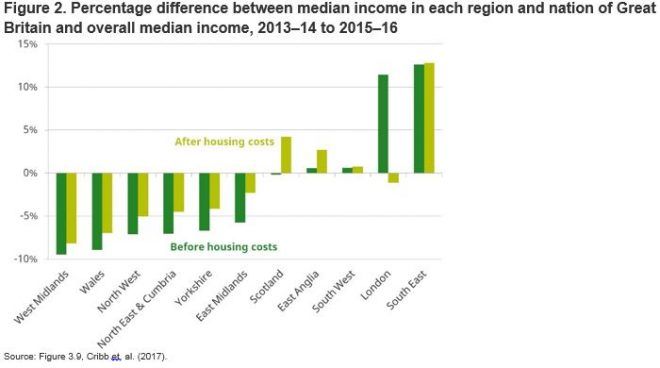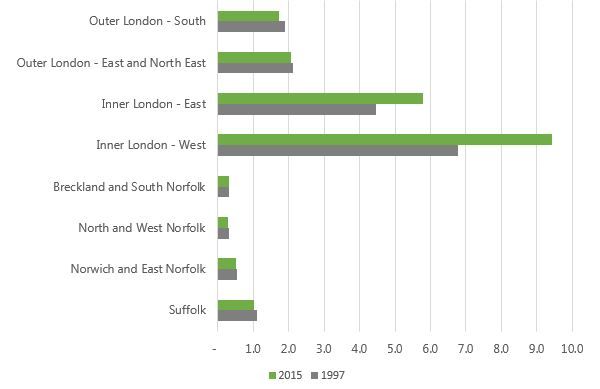From North to South, no community deserves to be abandoned

The North / South divide is not a myth…
-
Your life is likely to be shorter if you’re from the North of England rather than the South.
-
More young adults are dying before their time in the North of England than in the South. And the gap is widening.
-
As a child, you’re twice as likely to live in a workless household in the North East than in if you grow up in the South East…
-
And when there are new jobs in the North East, two-thirds are insecure (e.g. agency, temporary, or zero hours).
-
In old industrial areas, at the median men earn around £200 less per monththan the national level. And in these areas, the poorest-paid 10 per cent earn less than a third of median earnings across Britain as a whole.
-
Less than 1 in 3 (30.6 per cent) of residents in Yorkshire and the Humber are skilled at NVQ Level 4+, against 1 in 2 of all Londoners.
These are just a few stats I’ve picked to paint a picture about inequality between regions. The picture shouldn’t surprise anyone. For too long, weak economic growth has been symptomatic of a failed London-centric model.
The below chart from the IFS shows the difference in incomes across the British regions. The dark green shows the difference before housing costs, the light green after. It reveals an unacceptable home truth; those in the South East are well ahead of the average after housing costs, and the Midlands, Wales and North far behind:

…But it’s not all roses in the South
However North-South thinking is both dangerous and unfair. It’s dangerous because if the policy analysis is wrong, the policy prescription will be wrong.
There are 2 million union members in South East and East of England, many of whom are struggling. They’ll barely recognise any story that paints everyone South of the Watford Gap as being totally minted. This is where intra-regional differences are important to recognise. Inner London has continued to stride ahead in recent years, but the same can’t be said for other parts of the South:
-
Out of 21 NUTS 3 areas, in London, 10 had economic output lower than UK average in 2015.
-
Output in 13 London regions has fallen as a proportion of UK output since records began in 1997.
-
Outside of London, output across many areas has fallen or remained static. Certain Boroughs in the capital steam ahead as a share of UK output. Here is an example from Norfolk and Suffolk and London, using data for NUTS 2 (slightly bigger) regions:
Regional GVA as total of UK output, 1997 and 2015 (%)

Source: ONS Regional gross value added (income approach), December 2016
Just because a region has a relatively higher or an increasing GVA per head does not mean that all wages are increasing across the East and South East. The above chart shows that Outer London and Norfolk and Suffolk are not keeping pace with the gains seen in London’s centre. But it is these gains at the heart of the capital that are at the forefront of most people’s minds when we think about the North/South divide.
New approaches to regional industrial strategy
In too many communities, often (but not always) outside London and the South East, gone are the skilled and unionised jobs. These communities have been abandoned. A recent study by Sheffield Hallam University found that hollowing out of local labour markets, leading to lower pay and an increase in the number of benefit claimants, has been decades in the making.
That’s why a proper industrial strategy with a Great Jobs Agenda at its heart is so essential. But to address the inequalities, the government also has to listen to what the regions have to say.
What is the TUC doing?
Earlier this year we launched a series of studies into place-based industrial strategies. We’ve been looking at Liverpool, Tees Valley and Norfolk and Suffolk. We want to find out what’s needed to create great jobs in each area so that we can work towards re-balancing the economy. The studies have looked at issues ranging from skills to transport, governance reforms, and managing the impacts of Brexit. In the next few weeks, the TUC will be publishing the interim findings, with blogs posted here to summarise the headlines.
In the meantime, you can register for our free event: ‘Great Jobs in Great Places’, taking place on 23 October, where Greg Clark, Secretary of State for Business and TUC General Secretary Frances O’Grady will give keynote speeches that reflect on the research findings. To sign up, click here.
Stay Updated
Want to hear about our latest news and blogs?
Sign up now to get it straight to your inbox
